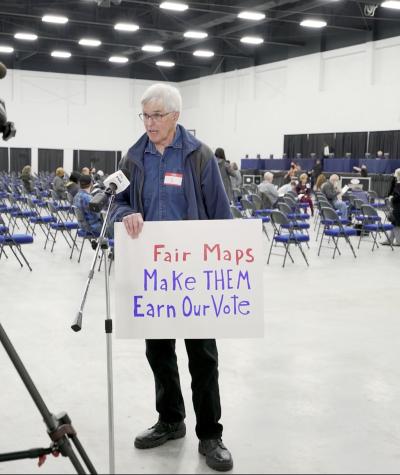Elections should be determined by voters, not politicians who manipulate voting maps. Gerrymandering — the manipulation of the map-drawing process for political gain — makes it easier for politicians and political parties to consolidate power and win elections at the expense of voters and our democracy.
Gerrymandering directly affects how communities are represented at every level of government — from local councils and state legislatures to the U.S. House of Representatives. These elected bodies make decisions that shape our daily lives, including public education, healthcare access and transportation.
When district lines are manipulated for political gain, it can dilute the power of voters, making it harder for communities to elect leaders who truly reflect their needs and priorities. Fair representation starts with fair maps — because voters deserve a meaningful say in who makes the decisions that affect them every day.
Campaign Legal Center (CLC) has been sounding the alarm on this issue for years. What we need now is a national solution to prevent gerrymandering of congressional districts nationwide.
Gerrymandering, Explained
There are three main ways that politicians manipulate maps to disadvantage voters and instead advantage themselves or their political party. These are:
- Racial vote dilution: Redistricting plans that minimize or cancel the voting power of voters of color.
- Partisan gerrymandering: Creating political maps that enable a political party to gain a systemic advantage for itself — or a disadvantage for the opposing party.
- Racial gerrymandering: Sorting voters into districts with a predominant focus on race. The U.S. Supreme Court has found that an excessive focus on race in drawing districts violates the 14th Amendment to the Constitution unless there is sufficient justification, such as compliance with the Voting Rights Act (VRA).
Learn more about what gerrymandering is here.
Fortunately, it is possible to combat gerrymandering and ensure that voters can choose their leaders, instead of letting politicians pick their voters. Campaign Legal Center has been at the forefront of advocating for key solutions.
Passing a Federal Ban on Partisan Gerrymandering
To prohibit gerrymandering at the national level, Congress should pass national legislation prohibiting partisan gerrymandering and mandating fair congressional districts in all states.
The U.S. Supreme Court shirked its obligation to protect Americans’ right to fair representation when it declared it was unwilling even to try to restrain partisan gerrymandering in Rucho v. Common Cause. The Freedom to Vote Act would change this and give federal courts the ability to determine when a gerrymander has gone too far.
The Freedom to Vote Act would employ standard quantitative measures of partisan fairness to see if each voter’s vote counts equally. It would also make it easier to bring legal challenges to a disputed map by permitting individual residents of a state and the U.S. attorney general to sue to enforce the law.
It would also promote greater uniformity in enforcement by having all partisan gerrymandering cases be heard in the U.S. Court of Appeals for the District of Columbia Circuit.
Learn more about the Freedom to Vote Act here.
Establishing Independent Redistricting Commissions to Create Fair Maps
Another way to combat gerrymandering is to limit the power of self-interested politicians in the mapmaking process. This is where Independent Redistricting Commissions (IRCs) come in.
IRCs are separate bodies from the state legislature that are responsible for drawing districts for congressional and state legislative elections.
The exact structure of IRCs can vary state-by-state, but they are generally a voter-centric reform that ensures voters — not politicians — decide how political maps are drawn. In several states, it is possible for voters to call for the creation of IRCs through ballot initiatives as has happened in states like Michigan and Colorado in recent years.
In addition to putting more power in the hands of voters, they also establish standards for who can serve on a commission. People who were recently or are currently elected officials, political party officials, lobbyists or government employees are often prohibited from serving on their state's commission.
IRCs are also responsible for ensuring that the maps drawn meet various criteria for fair and competitive districts and comply with the Voting Rights Act (VRA) to ensure that all Americans can have equitable representation in government.
In short, IRCs are an effective tool for empowering voters to solve gerrymandering at the state level and create fair maps.
Learn more about Independent Redistricting Commissions here.
Defending Against Racial Discrimination in Redistricting
Bolstered protections for the voting rights of communities of color, like those included in the CLC-endorsed John Lewis Voting Rights Advancement Act (JLVRAA), would ensure the already-illegal practice of racial gerrymandering is more effectively policed.
The passage of the JLVRAA by Congress would protect voters by solidifying well-established standards for evaluating VRA lawsuits and provide new protections against discriminatory voting laws. In so doing, it would help voters of color challenge unfair rules and gerrymandered maps that attempt to dilute the power of their vote. This would ensure that all voters can make their voices heard and elect officials who will best represent their communities.
The Time to Act Is Now
Banning partisan gerrymandering and adopting independent redistricting nationwide, along with strengthening existing protections, would allow voters to choose their elected representatives instead of the other way around.
Campaign Legal Center has vigorously worked to advance these solutions to end gerrymandering. Now Congress must enact them to allow voters — not politicians — to decide the outcome of elections. With your support, we can continue to fight for fair maps both in Congress and in court.


